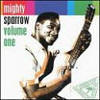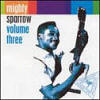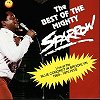Home Page
Free Newsletter
What's New
eCatalog
Audio Clips
Reviews
To Order
Payment Options
Shipping Info
Search
Profiles
About eCaroh
Things Caribbean
Calypsonian of the Century
The Mighty Sparrow
By Vaneisa Baksh,
Sunday Express (Trinidad)
In the realm of calypso, a kingdom rich in kings, princes and other nobles, it is difficult to isolate an absolute monarch. The citizens of this calypso kingdom are fiercely supportive of their chosen royalties, as the ongoing debate stirred up by Keith Smith has once again demonstrated. In the responses to Keith's invitation to choose the king of the century, two names have been steadily presented: the Lord Kitchener and the Mighty Sparrow.
These two have contributed enormously to the art of calypso, and to bow to
the practice of selecting just one required the establishment of a fine line
encircling certain criteria, particularly the global impact the calypsonian has
had, and the influence on the conditions and structure of calypso. Into that
circle then, steps the Mighty Sparrow, Slinger Francisco, replete with all the
regalia of a king of calypso.
[continued below]
Sparrow was born in Grenada but his mother, Clarissa came to join her husband, Rupert in Trinidad when he was eighteen months old, and this is where he grew up and calls home. His music started early, from school to the choir at St. Patrick's Catholic Church. Like everyone at the time, he listened to the music of American street quartets, pop and jazz, and calypso. The music of Lord Kitchener, Lord Melody, Lord Christo and the Mighty Spoiler rang in his ears and he decided he wanted to be a calypsonian.
His career started in 1954 as the Little Sparrow singing "The Parrot and the Monkey" which he followed the next year with the "High Cost of Living," but it was in 1956, after he had toured Guyana extensively and had an intensive training experience, that he jammed his way to public acclaim with "Jean and Dinah" which won the twenty-year-old his first Calypso King crown.
In 1958 he was the first with a triple win in the same year in the Road March Competition ("P.A.Y.E.," "Russian Satellite," and "Theresa," his first bilingual attempt). The Carnival Development Committee, for the first time, awarded him a cash prize.
He would go on to win the Calypso Monarch title eleven times, including the King of Kings competition. He has won the Road March title eight times, second only to Lord Kitchener. He had to retire himself to allow others to have a chance, but plans to re-enter the World Monarch and Road March Competitions this year (2000).
Listing his numerous titles cannot fully measure the man or his contribution. He has been one of the most prolific calypsonians of all time, particularly in the astonishing period of the late fifties and the sixties. By 1964, Sparrow had a hundred and fifty calypsoes to his credit. This remarkable abundance has led to criticism that he was not composing all of his music; but then, very few calypsonians can honestly claim to have composed all their songs. He credited Reginald (Piggy) Joseph then with having worked on at least fifteen of the 150 songs; and it is a tribute to Joseph that it is impossible to distinguish which ones could be Sparrow's and which are Joseph's compositions. They are all so completely in harmony with the personality of the Birdie that is distinctly aggressive, witty, salacious, humorous, biting and insightful.
It is this personality that has driven him to his dominion. He has fought for the improvement of the calypsonian's lot from the time he broke into the scene, and through his demands and persistence, many changes were made. In 1957, he sang the defiant "Carnival Boycott" and refused to appear in the Dimanche Gras show in protest of the paltry prize moneys for calypsonians and band leaders as opposed to the lucre for the beauty queens. This song triggered the formation of the Carnival Development Committee.
He was producing records at a phenomenal rate, and set up his own recording company in the beginning of the sixties, the first calypsonian to do so. He insisted on working with only the best musicians and was producing music that was lyrically and musically strong, and was not afraid to explore several themes in both his music and lyrics. In this regard, though he was innovative, he was also exploring all the traditional forms available. It opened the way.
At a time when calypsonians were not highly regarded, and their art form was not given the kind of recognition it deserved, Sparrow forced the calypsonians to see the possibilities they could explore to gain respect, independence and income. His repertoire is so extensive, covering every possible genre of the calypso: from social commentary, humour, politics; everything, that his genius is indisputable.
In 1969, the Government of Trinidad and Tobago presented him with the Humming Bird Medal, Silver; and in 1993, with the Chaconia Medal, Gold. He has travelled the world-the Caribbean, Europe, Asia, Africa, North and South America-taking the calypso internationally in a way no one else has yet equalled, despite the globalisation of today.
By the eighties, he was an international figure, recognised and honoured in several countries. In 1980, he was honoured by the Legislature of the Virgin Islands, in 1981, by Carifesta IV. In 1984, the city of New York declared May 18th Mighty Sparrow's Day, as the City of Winnipeg did on June 3, 1987, and the Borough of Brooklyn did on August 25, 1990. In 1987, the University of the West Indies made him an honorary Doctor of Letters. He had just returned from another visit to Nigeria, this time as Chief Omo Wale of Ikoyi, during his National Tour of Africa.
He has been presented with lifetime awards, with tributes for his contributions to communities, to the steelpan, calypso and world music. No calypsonian has so dominated his period as the Mighty Sparrow has done.
There have been several remarkable epochs in the history of calypso, and the talents that have emerged have been tremendous. As one of the masters of this epoch, David Rudder has pointed out in song, to name a few would make the others look small; but it is because he has been able to rise to the top of this pool of fecundity, Sparrow's role is particularly extraordinary.
His contributions have been significant in shaping the course of calypso and for that, we salute him as our calypsonian of the century.











